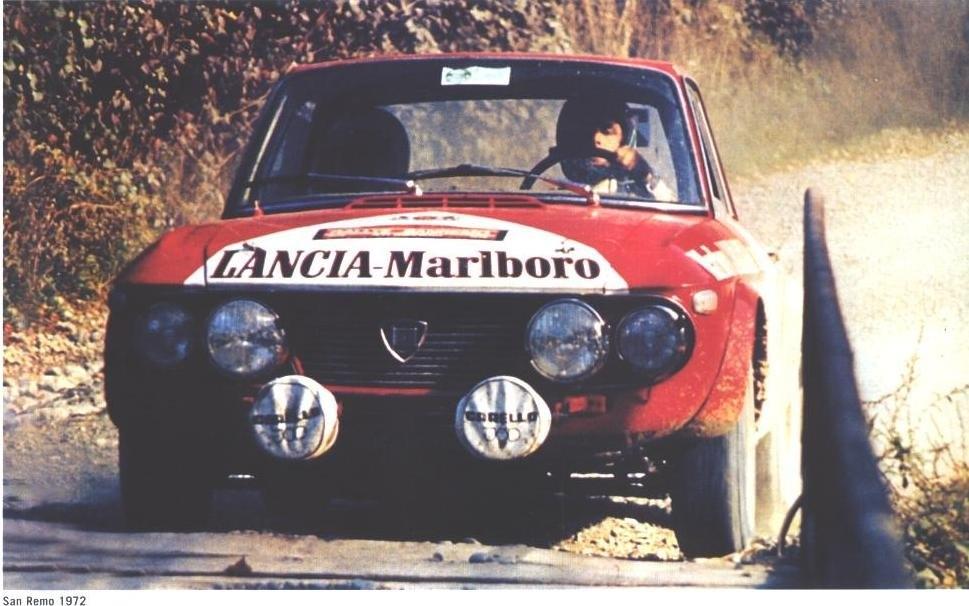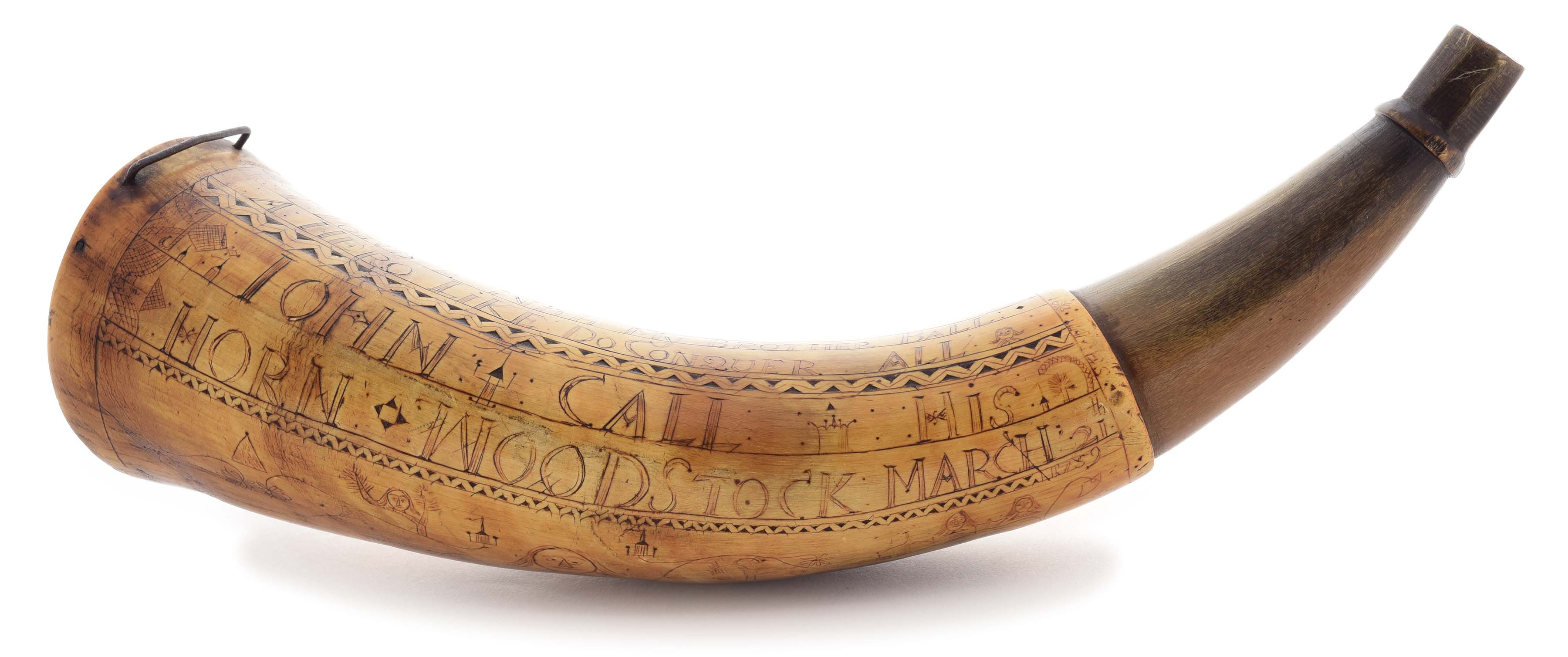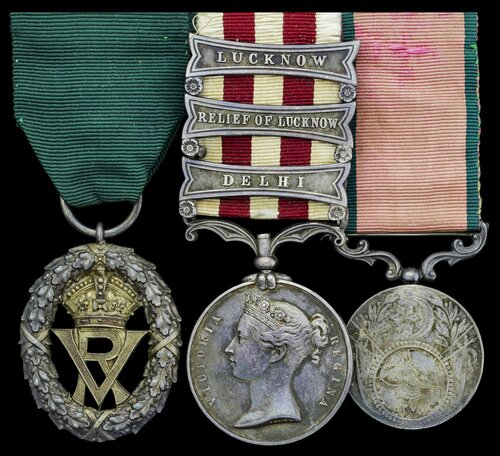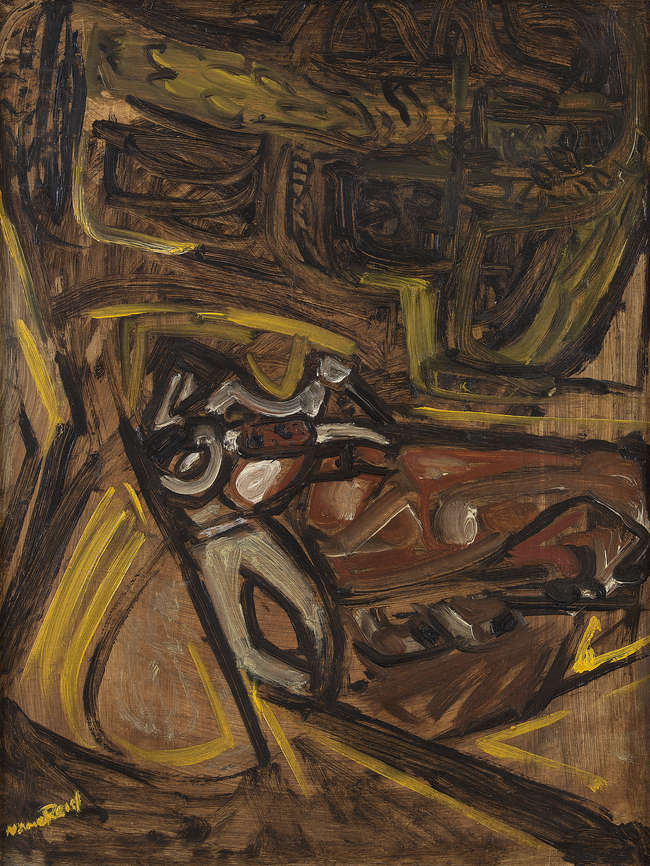The historic campaign group of five awarded to Field Marshal George Charles Bingham, G.C.B., 3rd Earl of Lucan, Colonel of the 8th Hussars and the 1st Life Guards, in command of the Light and Heavy Cavalry Brigades at Balaklava and wounded in the charge Crimea 1854-56, 4 clasps, Alma, Balaklava, Inkermann, Sebastopol (Lt. Genl. The Earl of Lucan) contemporary engraved naming, the clasps converted on to a fixed carriage to facilitate wearing; Jubilee 1887, silver; Order of the Medjidie, 5th class, silver, gold and enamel; Russia, Turkish War Medal 1828-1829, silver; Turkish Crimea, Sardinian issue, unnamed, some light contact marks but generally good very fine £14000-18000 Footnote See Colour Plate VII Provenance: Glendining’s 3 July 1997, Lot 380, withdrawn from sale and sold by private treaty. Lucan’s British and foreign orders were sold in the same sale (Lots 139, 140, 234, 268 and 326) and subsequently offered by Spink on 21 July 1998. Lord George Charles Bingham was born in London on 16 April 1800, eldest son of Richard, second Earl of Lucan. Lord Bingham was educated at Westminster, and was commissioned as Ensign in the 6th Foot on 29 August 1816. He exchanged to the 3rd Foot Guards on 24 December 1818, went on half-pay next day, and became Lieutenant in the 8th Foot on 20 January 1820. He obtained a company in the 74th Foot on 16 May 1822, and again went on half-pay, and on 20 June was gazetted to the 1st Life Guards. He was given an unattached majority on 23 June 1825, and on 1 December was appointed to the 17th Lancers. He succeeded to the command of that regiment as Lieutenant-Colonel on 9 November 1826, and held it until 14 April 1837, when he went on half-pay. During the term of his command the regiment remained at home, but he himself witnessed the campaign of 1828 in the Balkans, being attached to the Russian staff, for which the Order of St Anne of Russia (2nd Class) was conferred on him. He was M.P. for County Mayo from 1826 to 1830. On 30 June 1839 his father’s death made him Earl of Lucan, and in 1840 he was elected a representative peer of Ireland. He was made Lord Lieutenant of Mayo in 1845, and for several years devoted himself mainly to the improvement of his Irish estates. He became Colonel in the army on 23 November 1841, and Major-General on 11 November 1851. In 1854, when a British army was to be sent to Turkey, Lucan applied for a brigade, and on 21 February he was appointed to the command of the cavalry division. It consisted of two brigades - a Heavy Brigade under James York Scarlett and a Light Brigade under Lord Cardigan. The latter was Lucan’s brother-in-law but there was little love between them. No two men could have been less fitted to work together and there was soon friction. Cardigan complained of undue interference, and Lucan complained that his brigadier’s notions of independence were encouraged by Lord Raglan. At the battle of the Alma Lucan was present, but the cavalry was not allowed to take an active part in it. When the army encamped in the upland before Sebastopol the cavalry division remained in the valley of Balaklava, to assist in guarding the port. On 25 October the Russians advanced on Balaklava in force and captured the redoubts in front of it, held by Turkish troops. Their cavalry pushed onward, but the main body of it, numbering at least two thousand, was soon driven back by the brilliant charge of the Heavy Brigade (nine hundred sabres) made under Lucan’s directions. Owing to some misunderstanding the Light Brigade remained inactive, instead of improving this success. The Russians retired slowly, and Raglan sent an order that the cavalry should advance and take advantage of any opportunity to recover the heights. It was added that they would be supported by infantry. Having placed the Heavy Brigade on the slope of the heights in question, which were crowned by the captured redoubts, and having drawn up the Light Brigade across the valley to the north of them, Lucan was wait
The historic campaign group of five awarded to Field Marshal George Charles Bingham, G.C.B., 3rd Earl of Lucan, Colonel of the 8th Hussars and the 1st Life Guards, in command of the Light and Heavy Cavalry Brigades at Balaklava and wounded in the charge Crimea 1854-56, 4 clasps, Alma, Balaklava, Inkermann, Sebastopol (Lt. Genl. The Earl of Lucan) contemporary engraved naming, the clasps converted on to a fixed carriage to facilitate wearing; Jubilee 1887, silver; Order of the Medjidie, 5th class, silver, gold and enamel; Russia, Turkish War Medal 1828-1829, silver; Turkish Crimea, Sardinian issue, unnamed, some light contact marks but generally good very fine £14000-18000 Footnote See Colour Plate VII Provenance: Glendining’s 3 July 1997, Lot 380, withdrawn from sale and sold by private treaty. Lucan’s British and foreign orders were sold in the same sale (Lots 139, 140, 234, 268 and 326) and subsequently offered by Spink on 21 July 1998. Lord George Charles Bingham was born in London on 16 April 1800, eldest son of Richard, second Earl of Lucan. Lord Bingham was educated at Westminster, and was commissioned as Ensign in the 6th Foot on 29 August 1816. He exchanged to the 3rd Foot Guards on 24 December 1818, went on half-pay next day, and became Lieutenant in the 8th Foot on 20 January 1820. He obtained a company in the 74th Foot on 16 May 1822, and again went on half-pay, and on 20 June was gazetted to the 1st Life Guards. He was given an unattached majority on 23 June 1825, and on 1 December was appointed to the 17th Lancers. He succeeded to the command of that regiment as Lieutenant-Colonel on 9 November 1826, and held it until 14 April 1837, when he went on half-pay. During the term of his command the regiment remained at home, but he himself witnessed the campaign of 1828 in the Balkans, being attached to the Russian staff, for which the Order of St Anne of Russia (2nd Class) was conferred on him. He was M.P. for County Mayo from 1826 to 1830. On 30 June 1839 his father’s death made him Earl of Lucan, and in 1840 he was elected a representative peer of Ireland. He was made Lord Lieutenant of Mayo in 1845, and for several years devoted himself mainly to the improvement of his Irish estates. He became Colonel in the army on 23 November 1841, and Major-General on 11 November 1851. In 1854, when a British army was to be sent to Turkey, Lucan applied for a brigade, and on 21 February he was appointed to the command of the cavalry division. It consisted of two brigades - a Heavy Brigade under James York Scarlett and a Light Brigade under Lord Cardigan. The latter was Lucan’s brother-in-law but there was little love between them. No two men could have been less fitted to work together and there was soon friction. Cardigan complained of undue interference, and Lucan complained that his brigadier’s notions of independence were encouraged by Lord Raglan. At the battle of the Alma Lucan was present, but the cavalry was not allowed to take an active part in it. When the army encamped in the upland before Sebastopol the cavalry division remained in the valley of Balaklava, to assist in guarding the port. On 25 October the Russians advanced on Balaklava in force and captured the redoubts in front of it, held by Turkish troops. Their cavalry pushed onward, but the main body of it, numbering at least two thousand, was soon driven back by the brilliant charge of the Heavy Brigade (nine hundred sabres) made under Lucan’s directions. Owing to some misunderstanding the Light Brigade remained inactive, instead of improving this success. The Russians retired slowly, and Raglan sent an order that the cavalry should advance and take advantage of any opportunity to recover the heights. It was added that they would be supported by infantry. Having placed the Heavy Brigade on the slope of the heights in question, which were crowned by the captured redoubts, and having drawn up the Light Brigade across the valley to the north of them, Lucan was wait







/42161/Internet%20Image%201.jpg)


/119781/Internet%20Image%201.jpg)




Try LotSearch and its premium features for 7 days - without any costs!
Be notified automatically about new items in upcoming auctions.
Create an alert